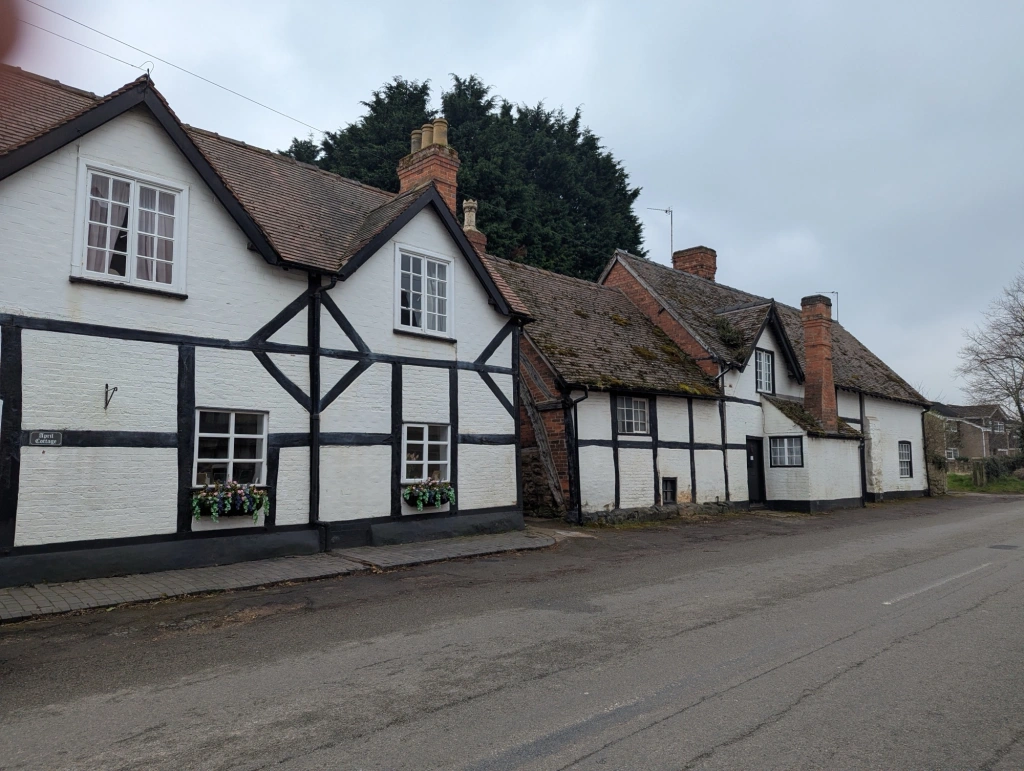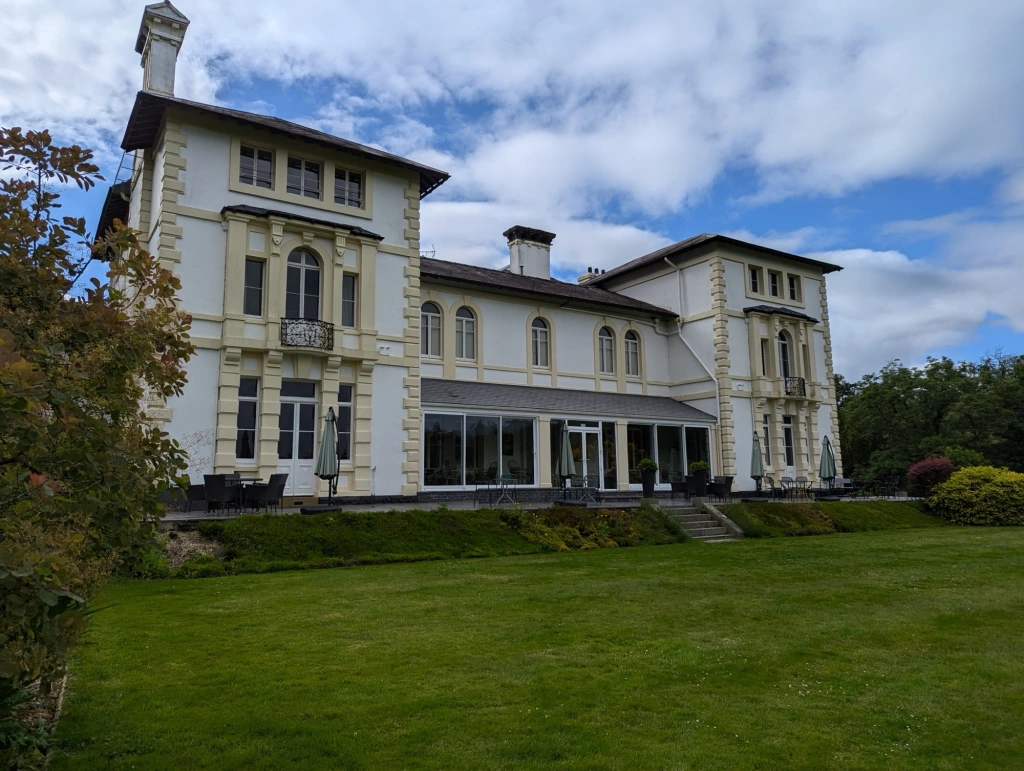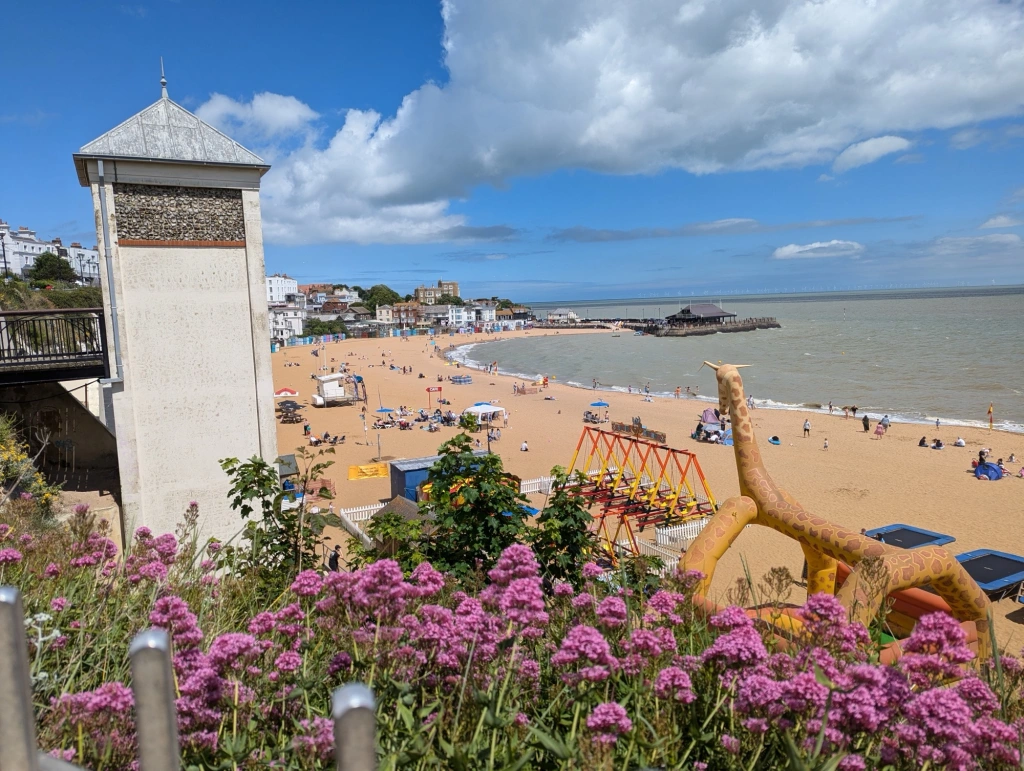Hotel Review
Twr y Felin Hotel (translated from Welsh to mean Mill Tower) started life as a windmill built in 1806 and is perfectly positioned on the Pembrokeshire peninsula to harvest the ever-blowing winds. It operated for 100 years before the sails fell off and then became a temperance hotel. Today it is Wales’ first contemporary art hotel filled with specially commissioned artworks and sculptures by 20 Welsh, British and international artists.
Location:
Twr y Felin Hotel is to be found in St. Davids, Pembrokeshire, South Wales. From the north take the A487 to Fishguard continuing along the same road to St. Davids. If arriving from the south take the A40 to Haverfordwest before joining the A487 into St. Davids. The nearest railway station is at Haverfordwest, 6 miles away. Trains call here from Cardiff and Manchester with connecting taxi and bus services to St. Davids.
Arrival and check-in:
We arrived at the hotel mid-morning as we had only driven the short distance from Roch Castle, the hotel’s sister hotel so we were excited to be staying in both a castle and a lighthouse whilst exploring the Pembrokeshire coast. The hotel is set within manicured gardens with ample car parking spaces for hotel guests. The entrance lobby has two discrete reception desks to one side and is surrounded by artwork lining the walls creating the impression of walking into an art gallery.
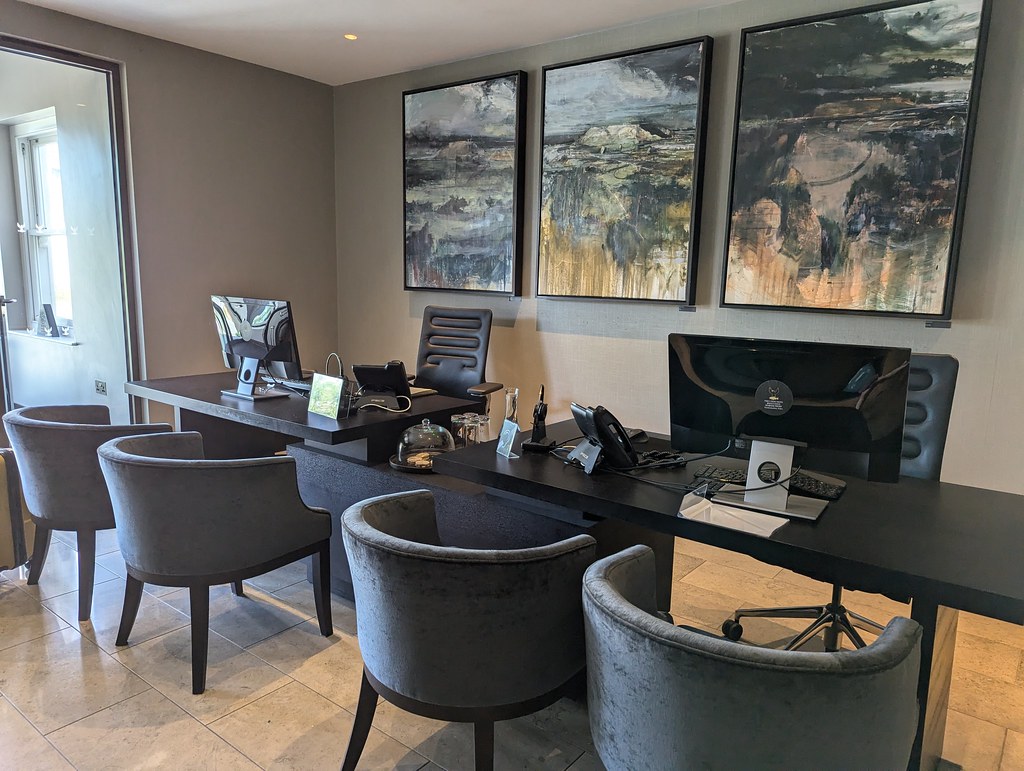
As we were so early our room was not ready but without asking, the receptionist said she would call us when it had been prepared. We left our luggage to explore Britain’s smallest city returning later in the afternoon to complete check-in formalities.
On our return we received a warm welcome and were handed a freshly baked Welsh cake each and given a short tour of the hotel. We were then escorted to our room along a contemporary gallery inspired corridor, and helped with our luggage.
The room:
We had been booked into one of the rooms in the original windmill building with its unique shape and windows. After spending the previous night in a castle at their sister hotel I didn’t expect things to get any better but our windmill room was spectacular too.
The slate grey and black minimalist decor enhanced the art work along the walls and with a super king size bed and a pair of leather armchairs perfectly positioned by the window to take in the distant coastal views, it was beautiful.
As with Roch Castle, there is exceptional attention to detail at every turn with coffee table books on the Welsh countryside, a Nespresso maker, kettle and a generous supply of luxury teas, coffee and chocolate not forgetting packets of mouthwatering Welsh shortbread. The hallway was lined with wardrobes on one wall whilst facing it, the large bathroom boasted both a deep bath tub and a large walk in shower. With Aromatherapy Associates toiletries, luxuriously oversized bath towels, fluffy robes and slippers, it was heavenly.
Dining:
Blas’ means ‘taste’ in Welsh, so it’s fitting it’s the name given to the three AA Rosette winning restaurant at Twr y Felin Hotel. Dining in the hotel’s fine dining restaurant is an experience like no other with not only art work adorning the walls but the exquisitely presented dishes also resembling artwork on a plate.
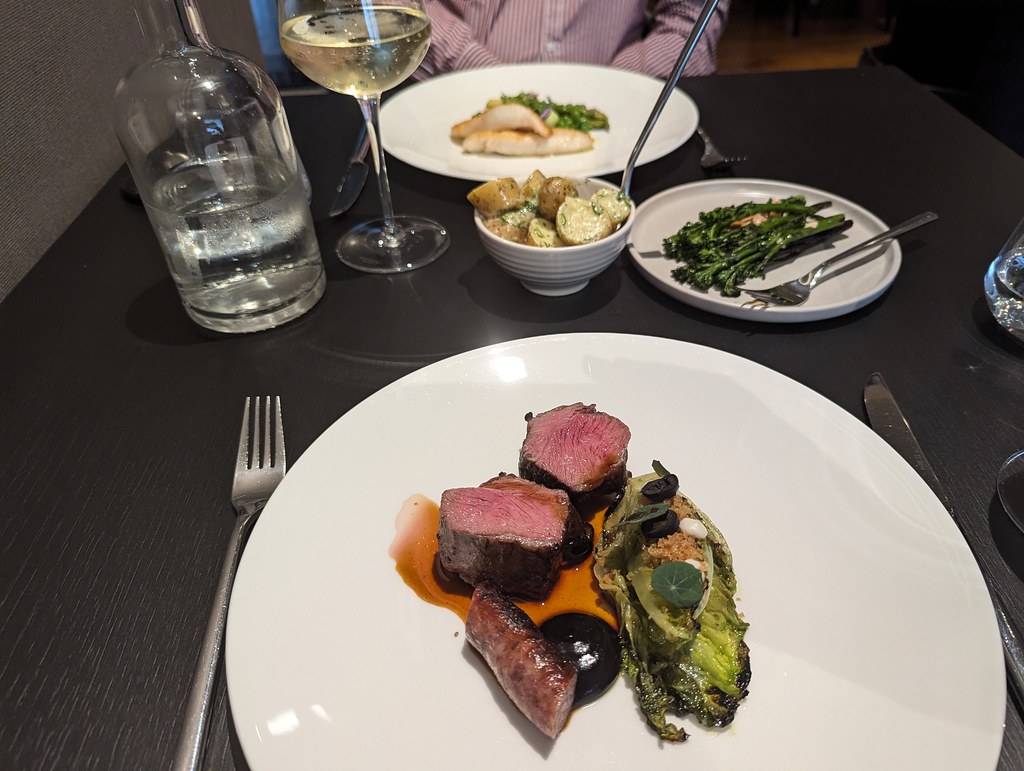
You might think that portions could be on the small side but we found each dish to be of a generous size. The menu emphasises local produce so there was no way I was going to pass on the opportunity of tucking into a dish of succulent Welsh lamb served with beetroot, goats’ cheese and wild garlic. Across the table my husband opted for fish, reliably informing me that his John Dory was one of the best ever.
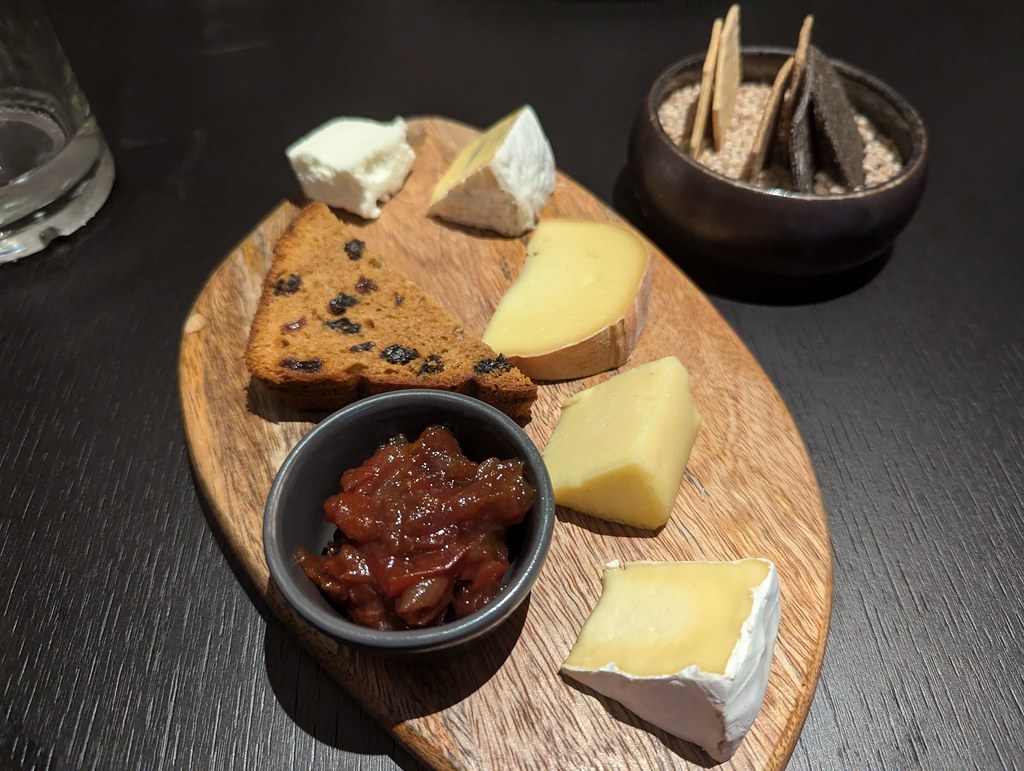
For dessert I couldn’t resist the plate of five Welsh cheeses whilst Mr. C. opted for the rather smaller white chocolate cheesecake so he was able to help me finish off my huge cheese platter.
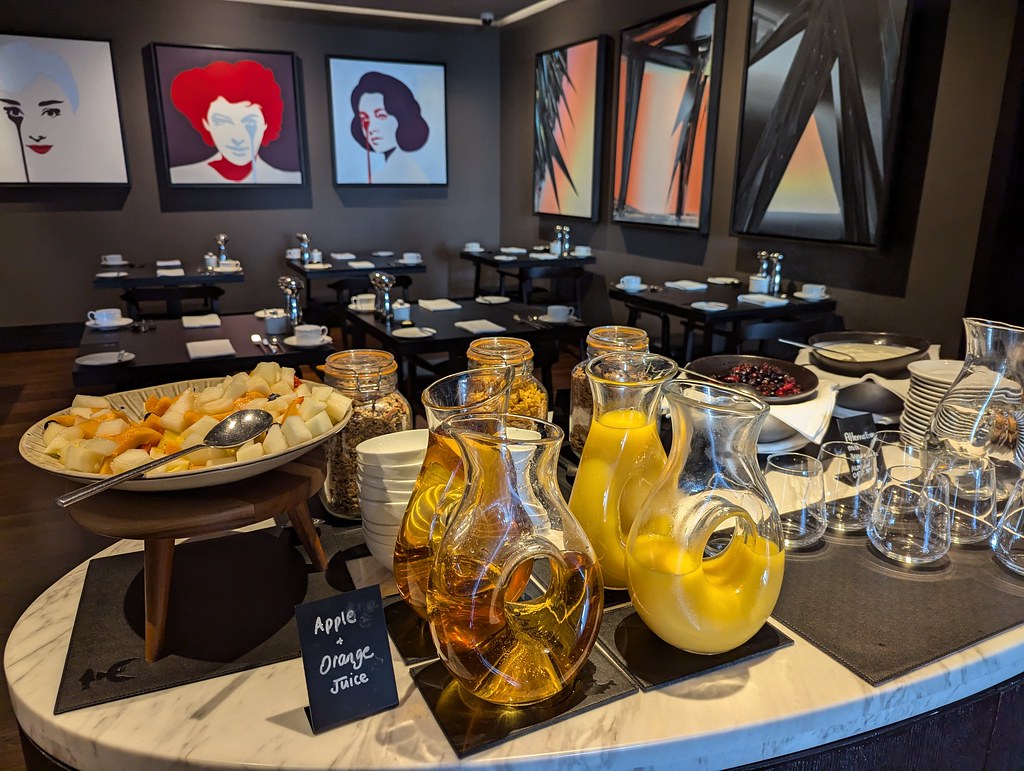
Breakfast is also served in the Blas Restaurant with an enticing buffet that included a mixed berry compote, yoghurt, honey and pastries straight out of the oven. Cooked dishes are prepared to order and our eggs Benedict and full Welsh were both declared delicious. Service was friendly and relaxed with extremely polite staff attending to our needs and bringing us extra cups of coffee to set the day going.
The Facilities:
Twr y Felin Hotel offers 39 ensuite luxury bedrooms, the Cornel bar, an art lover’s snug and Oriel, a dedicated gallery lounge. There are over 250 original artworks displayed around the hotel which have been specially commissioned to create works inspired by the spectacular landscape of the St Davids Peninsula and the Pembrokeshire Coast National Park.
The hotel offers art tours for guests wanting to know more about the unique interiors. We didn’t have time to take one ourselves but I’m certain it would be very interesting especially if combined with one of the hotel’s delicious afternoon teas.
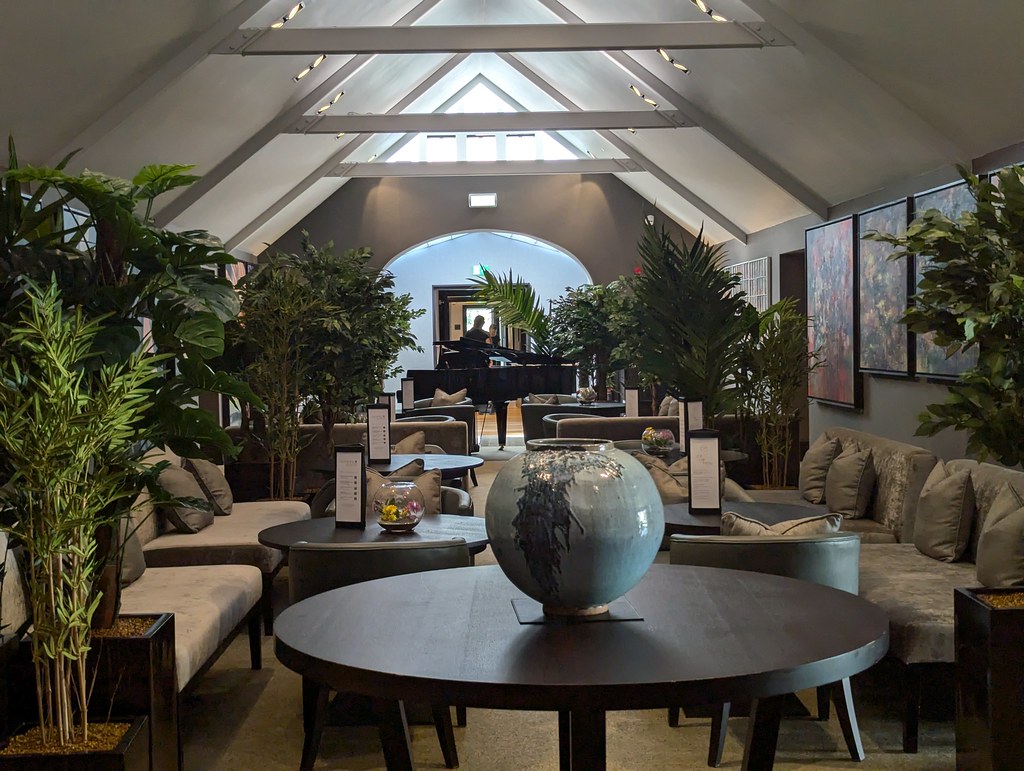
Although the hotel lacks a spa, treatments can be arranged at the hotel’s sister property, Penrhiw Priory, which is close by. There is also a meeting room which can be booked for events and private parties.
Outside the restaurant there’s a sunny terrace for pre-dinner drinks and a stroll around the extensive grounds is a must as they are beautifully maintained, and on our June visit were awash with colour.
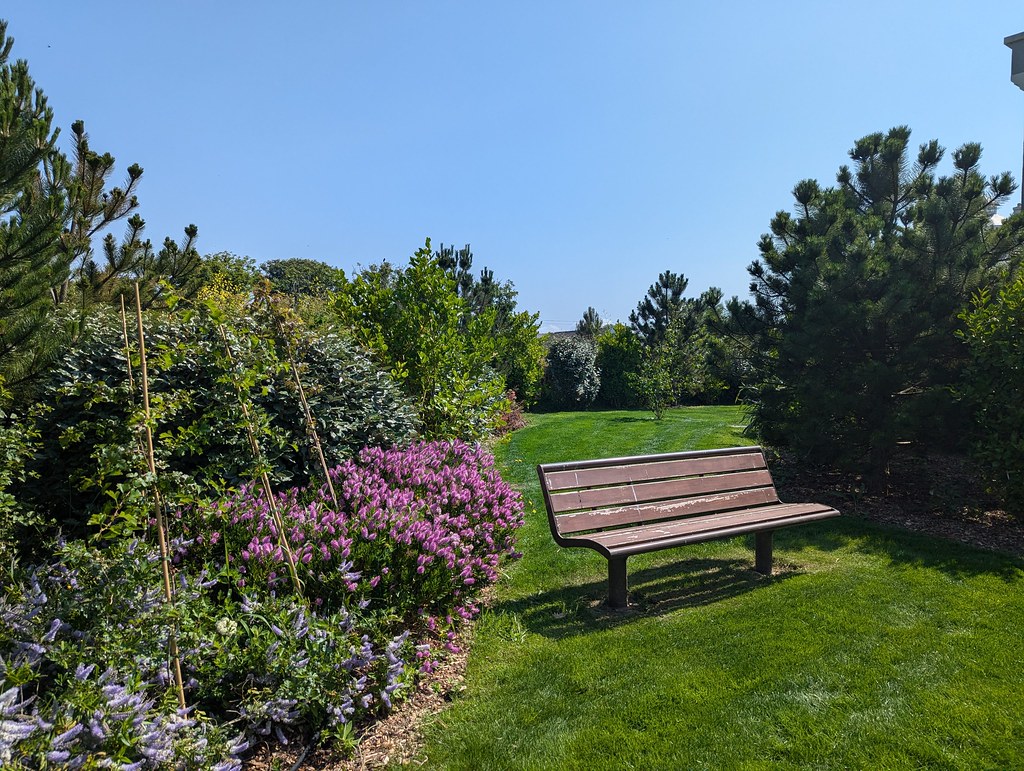
The art theme continues in the gardens with numerous statues dotted around to admire.
Out and About:
The hotel lies on the edge of St. Davids just across the road from the visitor centre and ten minutes walk to the cathedral so there is no need to use the car whilst exploring the city.
St. Davids:
St Davids is named after the patron saint of Wales, Saint David. It is the smallest city in Britain with a population of just over 1,600 and was awarded city status in 1995 although the roots of St Davids go back to the 5th century when St David himself lived there. The city was designated as a conservation area by the Pembrokeshire Coast National Park in 1972.
Oriel y Parc National Visitor Centre and Gallery
I suggest beginning your visit to St. Davids by spending time in the Oriel y Parc. The award winning building is run by the Pembrokeshire Coast National Park Authority serving as its visitor centre. It is also the Pembrokeshire home of the Museum of Wales with a gallery exhibiting art and artefacts that is free to visit. At the time of writing, finishing touches were just being made to an exhibition on ‘Courage and Community’, celebrating 200 years of the Royal National Lifeboat Institution (RNLI). With six lifeboat stations and 13 RNLI lifeguarded beaches along Pembrokeshire’s beautiful but hazardous coastline visitors can learn more about how the charity is dedicated to saving lives at sea. The exhibition will continue until 1st June 2025. Also to be found at the visitor centre is an Artist in Residence Tower, gift shop, cafe and e-bike hire. Oriel y Parc
Wander the streets of the U.K.’s smallest city
Clustered around the old Stone Cross are a selection of quirky small shops and cafes. From small independents including Solva Woollens and Basalt and Dune to high street favourites such as Crew Clothing, the tiny city centre ‘s sloping streets are an absolute delight.
Enjoy lunch at The Really Wild Emporium
Enjoy lunch along St. Davids high street at The Really Wild Emporium. Sustainability is the heart of the business with the interior boasting original stained glass windows, wooden floors, quirky lighting and a corrugated iron counter with nothing looking out of place. The ethos of the restaurant is fresh, local and wild utilising locally grown ingredients from the land and sea. We opted for savoury crab pancakes and bowls of fresh mussels which were divine, accompanied by glasses of local Pembrokeshire gin. Upstairs there’s a shop where you can buy a selection of their natural soap and skincare products all focussed on Pembrokeshire’s natural resources. Also on offer are popular foraging courses from Beginners Hedgerow through to Seashore. The Really Wild Emporium
St. Davids Cathedral
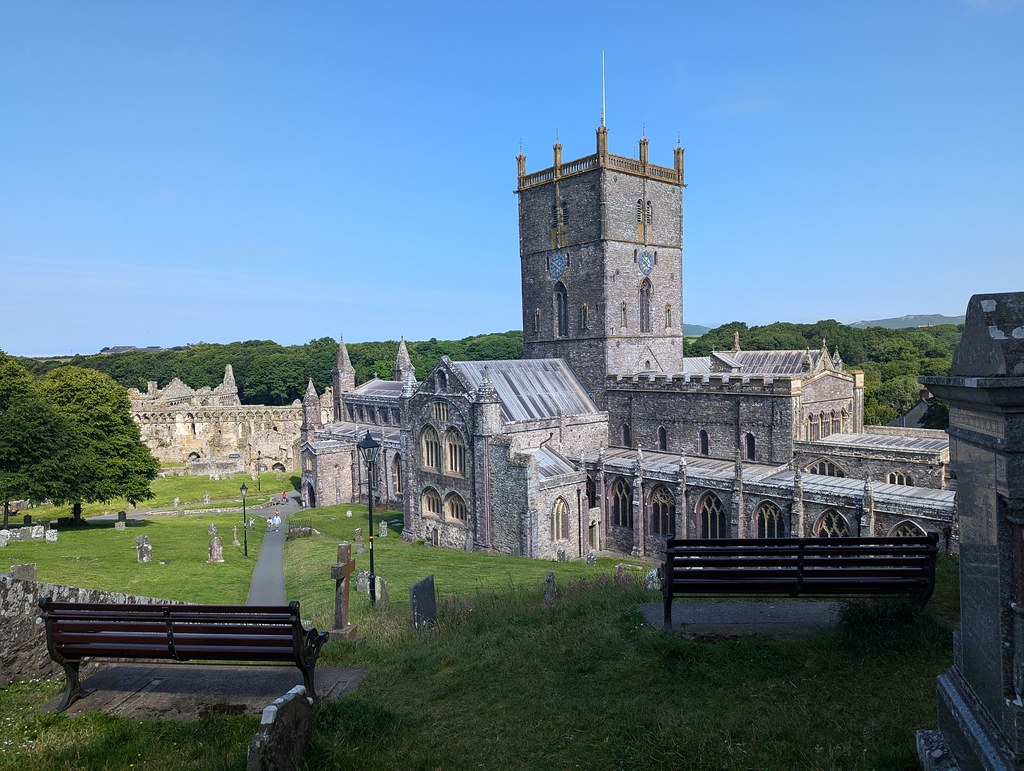
The magnificent Cathedral at St Davids dates back to the 12th century, although several older cathedrals were built before that on the same site. Unfortunately, St Davids was prone to Viking attacks, being so close to the sea and the older structures were destroyed.
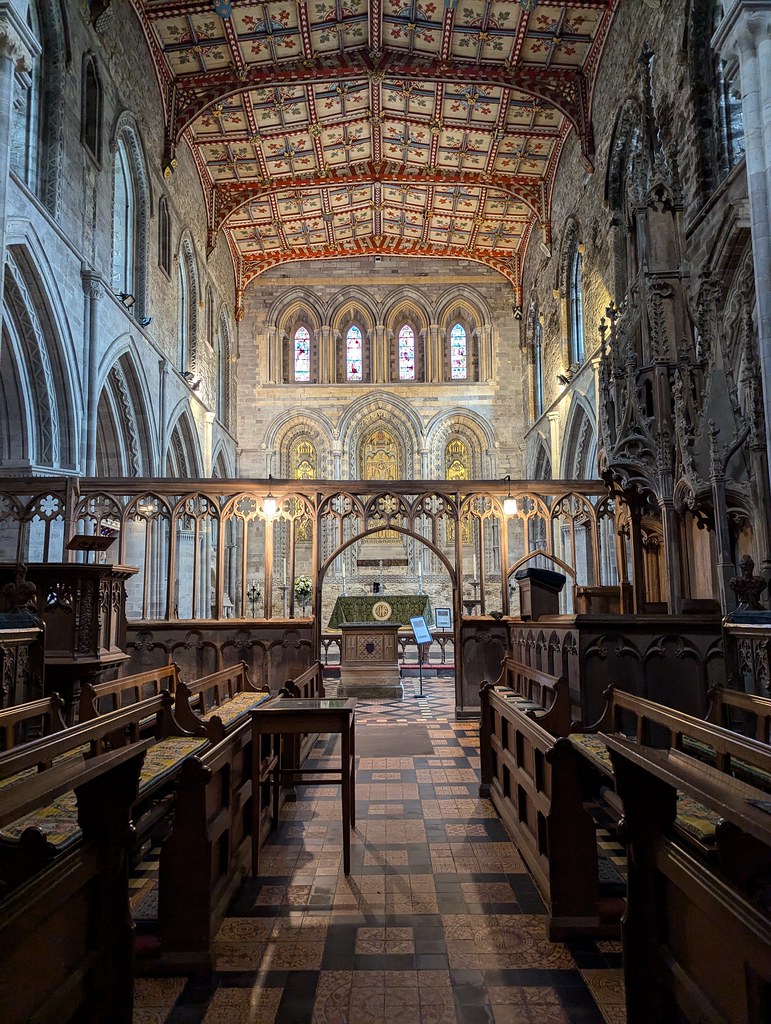
The cathedral we see today was constructed from dusky purple sandstone and is one of Wales’ most iconic religious sites, located in a sheltered valley beside the River Alun. View St David’s Shrine, a magnificent organ, the 15ft high gatehouse and bell tower, stunning stained glass, ornate ceilings, a treasury and library.
St. Davids Bishop’s Palace
This magnificent medieval palace was created by Henry de Gower, elected bishop of St Davids, who had a passion for architecture. Henry turned a building fit for ‘servants and animals’ into a palace, hosting feasts and welcoming distinguished pilgrims in the showy great hall. The Gothic ruins of the Bishop’s Palace lie on the opposite bank of the river to the cathedral and provide a suitably dramatic backdrop for open air theatre performances during the summer months.
Boat trip to Skomer Island
From St. Davids it’s just a 12 minute drive to St. Justinians from where boats depart to Skomer Island. There’s a £4 fee for the car park and as it’s cash only do remember to bring along some coins.
We took a two hour cruise to Skomer Island which had been arranged by Preseli Ventures in partnership with local boat trip activity provider Voyages of Discovery. Preseli Ventures offer a wide variety of outdoor activities across Pembrokeshire from coastal boat trips, kayaking, coasteering, SUP and canoeing to land based rock climbing, walking and rock pool safaris.
Between the months of April and July, Skomer Island is home to thousands of nesting seabirds including 42,000 puffins and 350,000 breeding pairs of Manx Sheerwaters and with our visit perfectly timed in June we couldn’t miss the opportunity of some spectacular bird watching. Whatever the weather, it can be quite cool as you travel on a fast moving RIB, so bring along a jumper or fleece, with waterproof coats being provided if needed. Tours have a full live commentary by a skilled ornithologist and are highly recommended.
Solva
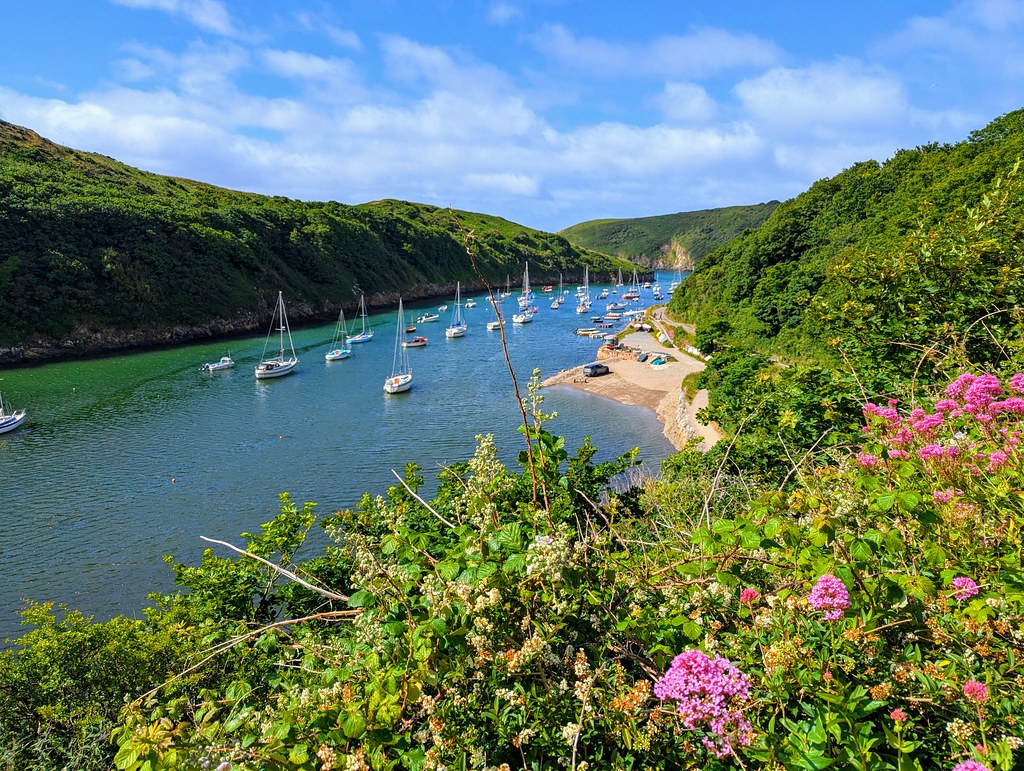
A short drive from St. Davids lies the picturesque harbour village of Solva. At high tide the beach is a narrow strip at the head of the inlet whilst at low tide the harbour is completely dry with the exception of a stream running down the middle. It’s a delightful place for a stroll and a walk around the quaint village followed by a drink and a bite to eat whilst watching the small boats bob up and down in the turquoise water.
Porthgain
Porthgain is a small coastal hamlet on the north coast of St Davids Peninsula, 20 minutes drive from St. Davids. Porthgain means ‘Chisel Port’ in English with the chisel representing the quarrying that once took place there. This small commercial harbour that was used for exporting stone from the nearby quarry is now a delightful tourist centre located in the heart of the Pembrokeshire Coast National Park.
Down at the harbour is The Shed which was once the machine shop for the engines that operated the brickworks in Porthgain. This unpretentious seafood restaurant has won numerous awards in recent years including the AA Wales Seafood Restaurant of the year. It serves up the freshest fish and chips imaginable. Dine indoors or purchase a takeaway and sit on the harbour wall admiring the view. The Shed, Porthgain
Overall:
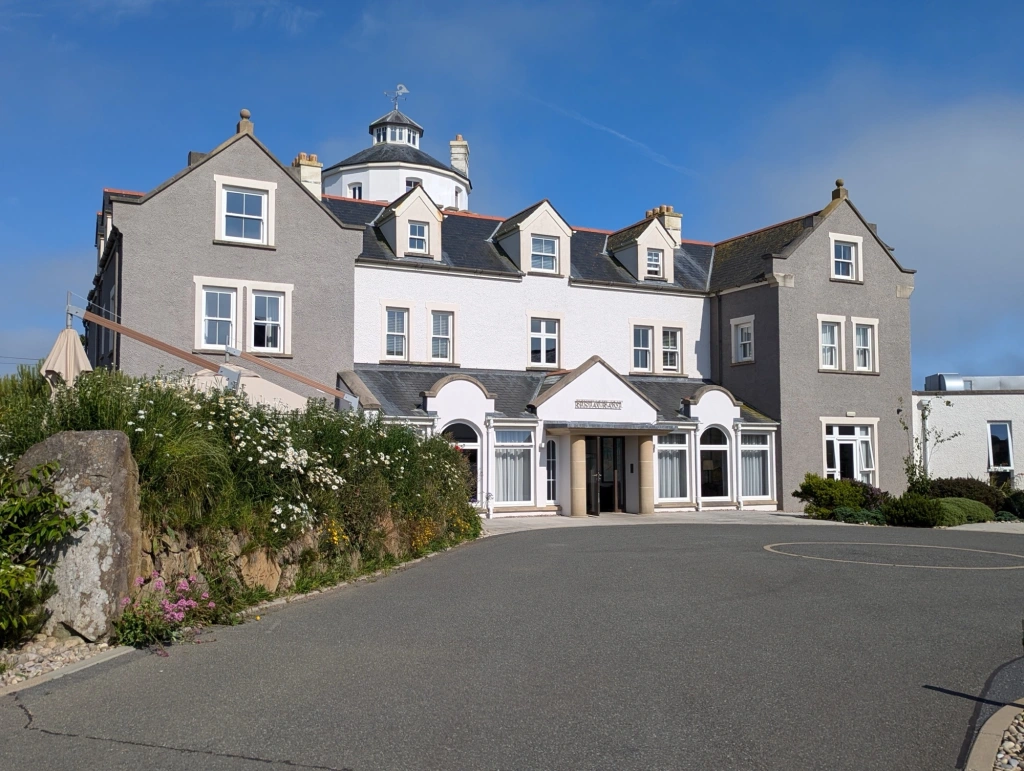
Our entire stay was an absolute delight. Where else could you go to combine staying in a windmill shaped room, have walls resembling a living art gallery and enjoy fine dining along with impeccable service. Twr y Felin ticked all the boxes for us as did the delightful tiny city of St. Davids and the scenic Pembrokeshire coast.

